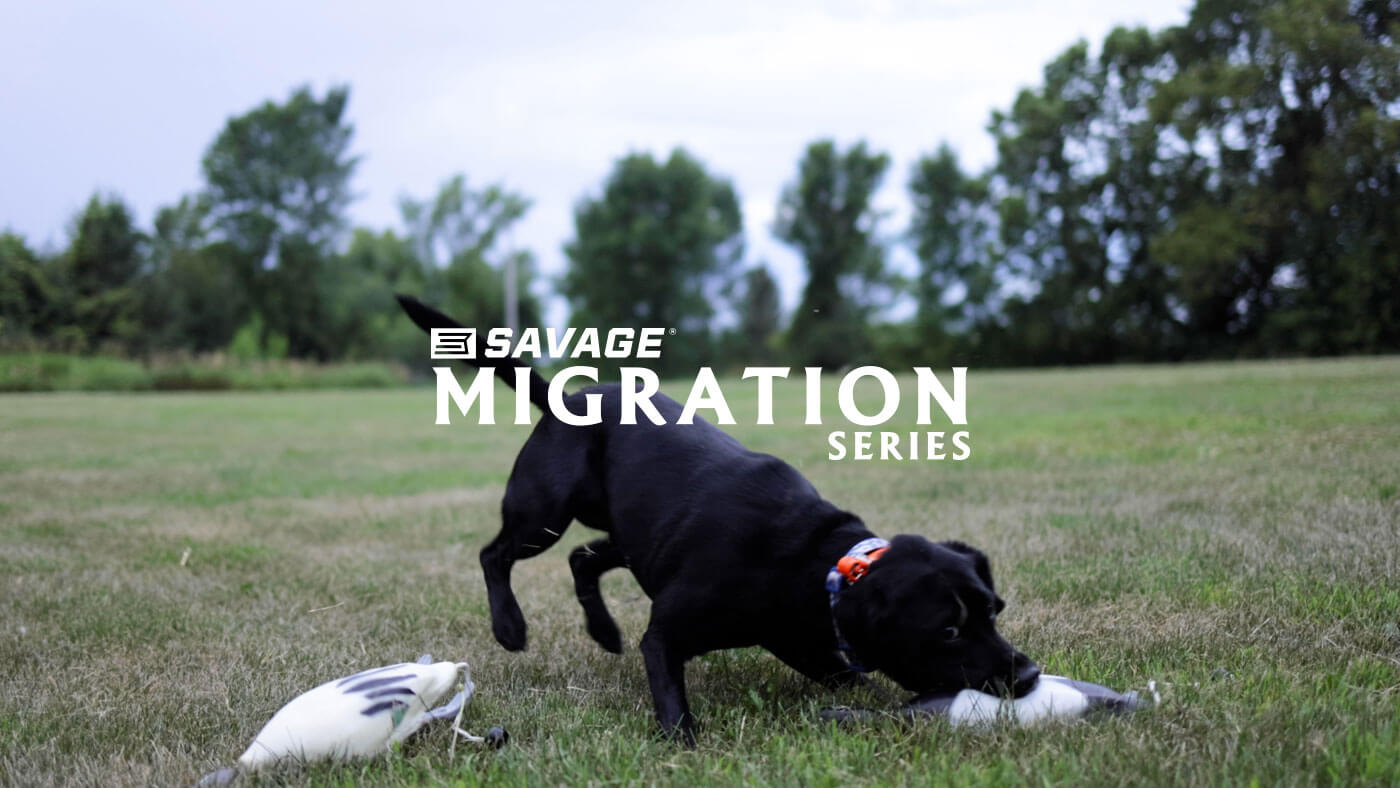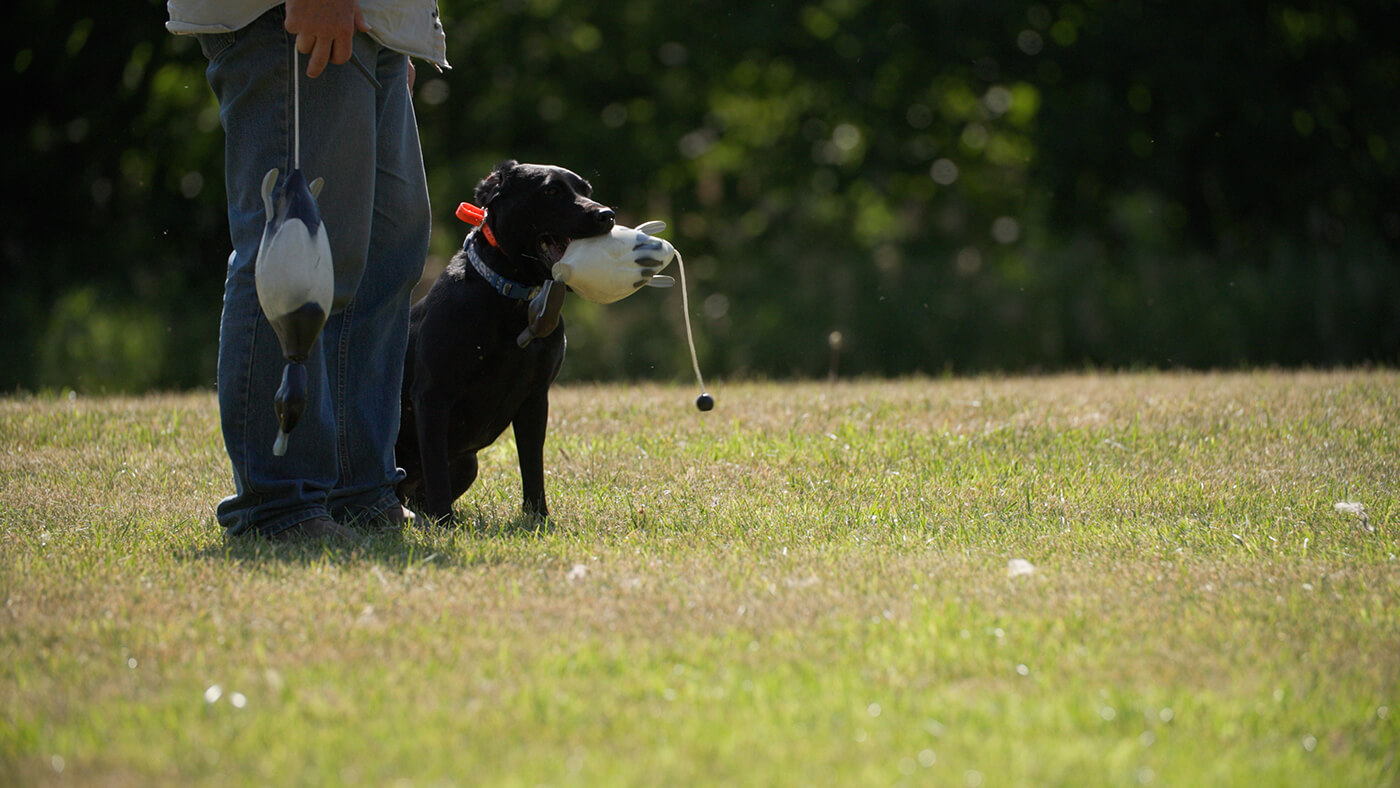- Savage Blog
- Migration Series: Dogs of Autumn | Jada & Jett
Migration Series: Dogs of Autumn | Jada & Jett

Waterfowlers are a different breed of hunter. There is so much that goes into a waterfowl hunt. Dropping ducks is fun, but that’s not what it’s about for most hunters. We’re nuts about our gear, borderline obsessive preppers, and most of all – we’re dog people. The bond with a hunting dog is undeniably one of the greatest friendships you will ever have. As hunting season approaches, you start to sense the bone-deep excitement in your dog, and it really starts to sink in that this is what they’re born to do. They have a light in their eyes, they’re happy to be alive -- they’re the dogs of autumn.
Getting a dog is a huge commitment, especially a hunting dog. You spend a lot of time and money to train your dog. Retrieving is an instinct to most dogs – any dog can play fetch. But training to be a good hunting dog takes those instincts to a whole new level. You spend countless hours fine-tuning each skill, so your dog does what they do best. Things like marking, steadiness, a soft mouth, and delivery to hand are all components to a successful day. And impressive skills that keep you as a hunter wanting longer seasons.

There are very few hunts where a waterfowler will not bring their dog. In fact, it feels wrong to hunt without your dog. That’s because there’s nothing quite like watching a dog come to life out in the field or on the water. They read the skies before the hunter does, they scan the water’s edge, and are “on” all the time, ready. The excitement radiating from their body is under tight control of well-trained focus until the moment they get released to retrieve each fallen bird. Then is 0-60 to get to that duck and bring it back.
It’s an unbelievable sight to watch them work. They give it everything they have, every-single-time. You end up hunting more for your dog than you do for yourself. It becomes this magical bond, this yin & yang type of activity. Waterfowlers are notorious for hunting in less-than-ideal conditions, but that makes no difference to your dog. They show up, ready and eager to please you, by your side every step of the way. Engraving images so vivid into your mind, you see them when you close your eyes. These memories last a lifetime.
Each year gets a little better than the last. As a dog ages, their drive does not go away. They just become steadier, more understanding of their role, and more focused. But it’s a sad day when you realize that your dog is aging to the point of retirement. Their drive is there, they still go NUTS when you get your gear together. But their body just can’t keep up like it used to. Their focus and joy get clouded by the deterioration of the body. You start to accommodate by only taking them on the early season hunts, so the cold weather doesn’t get to them. Or giving them extra rest days in between hunts. The day will creep up on you and the thoughts of “what should come next” start to set in.

To say there are mixed emotions about bringing a new puppy home to become your next water dog would be an understatement. It’s a tough decision to make and hard to know when the right time is. You’re acutely aware that the elder dog’s retrieving days are numbered. It’s something you don’t want to think about, but you know it deep down. But the time has come to get the next generation ready.
So, the cycle of training begins again. If you don’t already know it, you will soon, but a puppy revitalizes the spark and enthusiasm for hunting with its youthful energy. You’re in awe of this creature’s excitement to just BE there with you, its ability to learn and desire to work for you all while having the time of its life doing it. Also driving your old dog nuts along the way.

It can be a heartbreaking fact of life that your old dog doesn’t realize how old it is. It wants to keep pleasing you like it did as a puppy and every phase in between. If your dog’s last hunt snuck up on you and guilt about turning your attention to a puppy has crept into your conscious – you’re not alone. It’s something every waterfowler deals with. But as a season ends, a new one begins, the young “whippersnapper” puppy can keep you on your toes. It might even remind you of yourself as a young hunter, just giddy for birds. The first season with a puppy is rather thrilling as you look forward to working this dog for the next 10 years.
You start to look down the road, pondering how many seasons your dog has left and how many dogs you have left. That might be the mark of a true waterfowler – a person who measures their life by their dogs.
It’s the stuff the dogs of autumn put into your life that’s important.

Mike Schulenberg is the owner of Wings and Whistles dog training facility in Watertown, Minnesota and has been training dogs for over 35 years. His specialty is one that lies close to his heart – water dogs. Mike is an avid waterfowl hunter and says, “if I can’t bring my dog, then I don’t want to go.” Mike recalls how Jada, his old Labrador, has been his best hunting dog and retrieved 269 ducks in her first season. At 12 years old, Jada can’t hear and so Mike no longer takes her hunting, fearing the worst. In this episode of the Savage Migration Series, Mike talks about his love for his dogs and the internal struggle every waterfowler goes through when it’s time to retire an old dog and start training a new puppy.
Follow the Migration Series.


